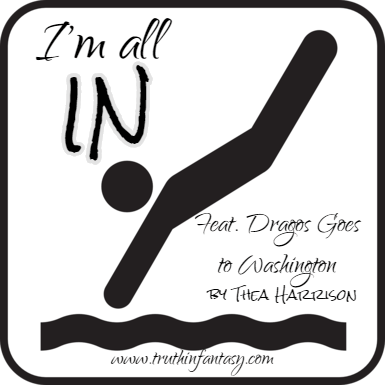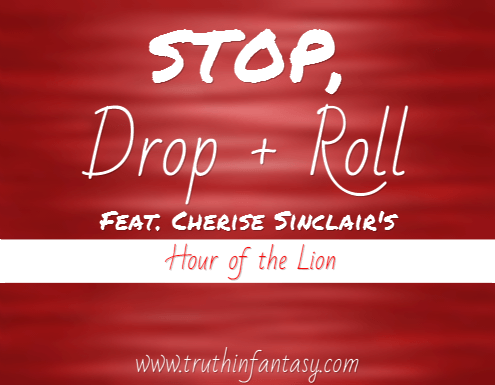I just finished my fist reading of Dragos Goes to Washington, the next (short) installment in the Elder Races series by Thea Harrison. At the risk of sounding like a total loser fan girl in serious need of a life, I adored this novella and I'm sure I'll read it several more times over the next couple of months. I could not, and did not put it down from page one till the bittersweet end (bitter because I have to wait another month for the next novella, sweet because, hey, it's PNR and everybody gets an HEA--except the bad guys, of course--they just get dead). With respect to Pia and Dragos and all the rest of the Elder Races, I'm all in. Just like Thea Harrison describes Pia and her dragon mate, "When they were together, they were all in..." Being all in is the best place to be. And one of the hardest places to get to, at least for me. Which of course deserves an exploratory romp through the convoluted recesses of my grey matter. But hey, you're reading this, so hang on for the ride.
I am fascinated by the concept of being all in. I've thought about it, I've read about it, and I've experienced this elusive state for brief, shining moments--that sometimes last days, weeks, or maybe even years, but which always seem to pass sooner or later. Which leaves me searching for the next peak experience where I can feel all in.
Like for Pia and Dragos, love, especially new love, can make us feel all in. There is absolutely nothing like the feeling that your new love is the key to the universe, the golden ticket to eternal happiness, the missing piece of the soul. Tomes have been written about the sensation of merging our hearts, minds and spirits with someone we believe understands us and accepts us in ways that no one ever has or ever will, so I'll assume you know what I'm talking about. It's a blissful feeling, no doubt about it. No matter how it turns out in the end (or at least after the beginning) the all in aspects of new love are life altering.
But romantic love is not the only thing that produces that all in feeling. Parents can feel that way for their newborns, getting lost in the wonder of new life and the power of creation. Heady stuff. We can be all in with respect to new friends, and even new geographic locations. The all in feeling is easier to access, certainly, during the honeymoon phase of any relationship, but that phase can last a very long time, if we're lucky.
And then there are those who are very fortunate, indeed. I'm taking about the lucky dogs who fall in love with their work or avocations to the point that they are all in for the better part of their lives. It is one area where I've yet to conquer my envy of those immensely blessed individuals who find their passion early and remain faithful to the end of their days. I have a favorite cousin like that; he was discovered by an engaged high school teacher and mentored toward a lasting love of inorganic chemistry. His face absolutely glows from within when he discusses crystal formation and why I should care (I'm sure I should, but I just don't. Sorry, Josh). Then there are those who find their sweet spots later in life, like my ex-fiancé who discovered horseback riding in his mid-thirties and has pursued his passion with a passion ever since.
Quite some time ago, I remember reading a book by the hopelessly unpronounceable Mihaly Csikszentmihalyi called Flow. The book is about the psychology of optimal experience and I remember thinking very clearly, I gotta get me some of that. According to Mr. Alphabet Soup, we experience flow when we are so completely absorbed in an activity that time seems either to stand still or increase to light speed, we cease paying attention to bodily needs and functions, and we become one with all things as we lose the sense of our own boundaries in the cosmos. Who wouldn't be happy under such circumstances? Flow is the state of being all in.
But there's a catch--and isn't there always, dammit? In my world, optimal experiences, those where we are all in, or in the zone or the groove or the flow, are as rare as a tuxedo at a Grateful Dead concert. So what do we pitiful humans do? Well, we make like William Hurt and try to achieve altered states. We pursue better living through chemistry. We seek out extreme adventures to feel the rush that reminds us that we are alive. We take stupid risks to try to experience a poor man's version of flow, because those optimal experiences are flowing past us without stopping to let us feel the burn.
I have a friend I meet for dinner about once a month. After we catch up on the quotidian occurrences at work and at home, we always end up talking about ways to be all in. We both crave it, and because our temperaments are similar, we both feel flow from the same kinds of things. And it is equally inaccessible to both of us, so I know it's not just me.
I yearn to be all in. I desperately want to feel like Pia and Dragos. For a lot of reasons. It would be way cool to breathe fire. Or fly, or heal with my blood. But what I can more or less reasonably aspire to is to be all in. Of course, when I’m reading my beloved books, I’m pretty much there, so maybe I’m the lucky one after all.




















